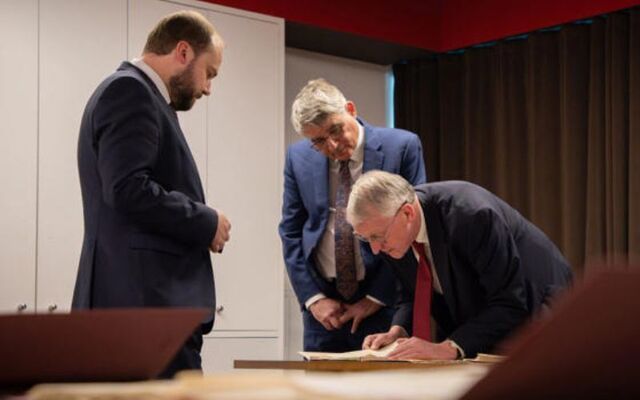The Secretary of State for Northern Ireland, Hilary Benn MP, set out the details of two landmark archival projects relating to the Troubles on Wednesday, April 9.
"These projects will provide a unique resource for anyone interested in the history of the Troubles and government policy," the Northern Ireland Office said on Wednesday.
"They will seek to build public confidence through greater accessibility and transparency, and provide a deeper understanding of UK Government policy and decision-making on Northern Ireland during the Troubles."
The details of the two projects were announced the day before the 27th anniversary of the signing of the Good Friday Agreement.
The Secretary of State has announced details of two landmark archival projects relating to the Troubles. @hilarybennmp set out UK Government plans following a visit to @UkNatArchives at Kew. More details here. 👇 https://t.co/DwDmVZtjiN
— Northern Ireland Office (@NIOgov) April 9, 2025
The first - one that is largely welcome - is a project to digitize and publish open UK Government records relating to the NI Troubles in collaboration with The National Archives.
This, the Northern Ireland Office says, will broaden access by publishing digital copies of paper records that have previously only been available by visiting The National Archives at Kew, making them free to view online.
The second is an archival research project, which was first announced last year.
This project, the NIO says, will see official historians appointed, following a transparent and independent recruitment process, to research UK Government policy towards Northern Ireland during the Troubles. Expressions of interest in the historian roles are now being sought.
The historians, the Northern Ireland Office says, will be "given full access to UK state archives" - a notion that was met with criticism both last year and again this week.
During a visit to The National Archives at Kew this week, Benn said: "I am pleased to support work by The National Archives to digitize and publish key records relating to this complex period in our history.
"I have seen today examples of the records digitisation process and look forward to the first records in this project being published in the autumn."
He continued: "I am also grateful to members of the academic advisory panel for lending their expertise to the important archival research project, and I have every confidence that they will ensure it is conducted to the highest academic standards.
"Their first task will be to identify highly qualified and independently-minded historians via open competition, and I would encourage anyone interested in this project to find out more on their website.
"Taken together, these projects will provide an invaluable resource for the public, journalists, educational institutions, researchers, and academics, making information about this period in Northern Ireland’s history more accessible, and so making government decision-making more transparent."
Saul Nassé, Chief Executive of The National Archives, said: "The National Archives’ documents provide a valuable perspective on the Troubles.
"This project will mean the widest possible audience will be able to view the records online to grow their understanding of this significant period in modern history."
Co-chairs of the independent advisory panel, Professor Caoimhe Nic Dháibhéid and Lord Bew, said: "We welcome the Government’s strong commitment to increasing access to state archives, which has been an important part of dealing with the past in many other countries.
"The Government has rightly recognised the need for work of this nature to be conducted transparently and independently, and as co-chairs of the expert advisory panel we look forward to engaging with colleagues across the academic community as we collectively seek to further understanding of this important period in our history."
"Highly dubious"
Last year, the announcement of the archival research project - in particular the promise that historians will receive "full access to UK state archives" has been met with some criticism.
Marie Coleman, a Queen’s University 20th century Irish history professor, told the Irish News she is “highly dubious about the belief that the historians will have access to everything” among the still secret state papers."
“And even if they do, will this be privileged access just for them? If so, how can others check the veracity of the research outputs?” Coleman added.
“This is central to the ethical basis of the scheme and this remains unclear.”
Prof Coleman further noted any copyright on published work will be retained by the Crown, which she says "has implications for the intellectual property of any researchers engaged in the project."
She added: “At the very least, any researcher contemplating applying for the roles advertised would be well advised to request clarification on how the ethical process will operate and on the extent to which they will retain any intellectual property over their own research on this project.”
Also speaking with The Irish News, Daniel Holder, director of the Committee on the Administration of Justice (CAJ), described the “official history” as “a highly discredited initiative of the last Tory Government linked to the Legacy Act."
Holder said the Northern Ireland's Office statement this week "implies that the Labour Government are going to just press ahead with it."
He added: “When CAJ and academic colleagues met with (a then Conservative minister) we asked what the purpose of the official history was.
"His response was that the British government was entitled to put forward its version of history.”




Comments